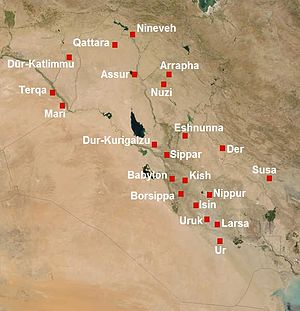Arrapha

Arrapha or Arrapkha (
In 1948, Arrapha became the name of the residential area in Kirkuk which was built by the North Oil Company as a settlement for its workers.
History
The first written record of Arrapha is attested from the
The city was occupied around 2150 BC by the
Arrapha was an important trading center in the 18th century BC under Assyrian and Babylonian rule.
The city reached great prominence in the 11th and 10th centuries BC as a part of Assyria. In 615 BC, seeing the Assyrians occupied with the
Arrapha then fell to the
Between the mid 2nd century BC and mid 3rd century AD, during the
Arrapha has not been excavated yet, due to its location beneath modern Kirkuk.[1]
See also
- Cities of the ancient Near East
References
- ^ ISBN 978-1-134-15908-6. Retrieved 27 October 2012.
- ^ Edwards, Charlesworth & Boardman 1970, p. 433
- ^ Edwards, Charlesworth & Boardman 1970, p. 443
- ^ East, William Gordon; Spate, Oskar Hermann Khristian (1961). The Changing Map of Asia: A Political Geography. p. 105.
- ISBN 9780141938257.
- ^ a b Kimmons, Sergeant Sean. "Soldiers Help Preserve Archeological Sites".
- ^ a b M. Chahin. Before the Greeks, p. 77.
- ^ Qader, Asoss M. (2013). Arrapḫa (Kirkuk) von den Anfängen bis 1340 v. Chr. nach keilschriftlichen Quellen (PDF). Würzburg: Universität Würzburg. pp. 121, 124. Retrieved 1 March 2024.
- ^ Martin Sicker. The Pre-Islamic Middle East, Page 68.
- ^ I. E. S. Edwards, John Boardman, John B. Bury, S. A. Cook. The Cambridge Ancient History. p. 178–179.
- ISBN 9789004116412. Retrieved 7 May 2020.
- ISBN 978-3-447-03652-8.
Sources
- Edwards, Iorwerth Eiddon Stephen; Charlesworth, Martin Percival; Boardman, John (1970). The Cambridge Ancient History: Vol. 1, part 2. Cambridge University Press. ISBN 9780521077910. Retrieved 3 January 2013.
